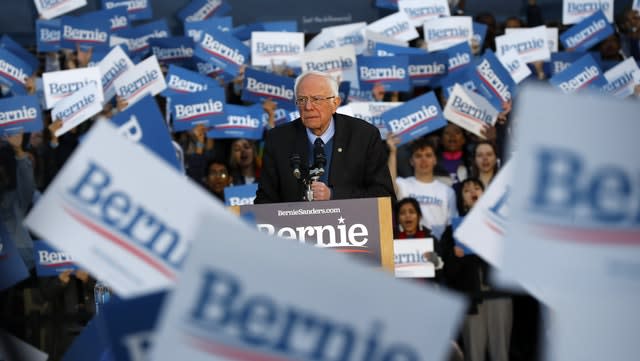Joe Biden and Bernie Sanders clash in state won unexpectedly by Trump in 2016
Michigan is the largest of six states holding Democratic primaries on Tuesday in a race that has become a showdown between former vice president Joe Biden and Senator Bernie Sanders.
But many voters are already looking ahead to November and whether President Donald Trump can again win in the state that perhaps more than any other catapulted him into the White House in 2016.
For Mr Sanders, the stakes could hardly be higher.
He defeated Hillary Clinton in Michigan in 2016, emboldening his argument that he could win with a diverse coalition that drew well from young voters, working-class whites and African Americans.

But it is the kind of victory he has not been able to replicate this time, and if he does not on Tuesday, any chances at the Democratic nomination may be greatly diminished.
Mr Biden has been emphasising the Obama administration’s bailout of the car industry, which provided an economic lifeline for GM and Ford, likely saving thousands of jobs.
He is also counting on continued strong support among African American voters.
How Michigan votes will also be clarifying for November.
Some see Mr Sanders’ sweeping promises to cancel student debt and provide health care for all potentially energising young voters but not older ones wary of his democratic socialist ideology.
Centrist and safe, Mr Biden could do exactly the opposite, though.
If we give Donald Trump four more years in the White House, our planet may never recover.
— Joe Biden (Text Join to 30330) (@JoeBiden) March 8, 2020
Others worry that both candidates are taking black Democrats for granted.
All that may add up to neither being able to carry the state against Mr Trump.
“There’s not a lot of energy, not enough energy, I would say, even for the primary,” said Michigan state Representative Sherry Gay-Dagnogo, whose district includes a large swathe of northwest Detroit.
She said the Democratic Party continues to use the same playbook of waiting until the last minute to do intensive community outreach — which crippled it in 2016.

Indeed, major party turnout in Wayne County, which encompasses Detroit and is strongly African American, fell by more than 64,000 votes in 2016 as compared to 2012.
That was especially important since Mr Trump levelled the Democrats’ famed “blue wall” with narrow wins in states that were supposed to comfortably go to Hillary Clinton: Pennsylvania, Wisconsin and Michigan, which he won by just 10,704 votes out more than 4.8 million cast.
Tuesday will be the first test of Democrats’ ability to take them back.
They already can point to hopeful signs.
Governor Gretchen Whitmer, who has endorsed Biden and been mentioned as a possible vice presidential pick, won in 2018, as fellow Democrat and Senator Debbie Stabenow was cruising to re-election.
Veteran Michigan pollster Bernie Porn said the president remains unpopular with independents and Republican women, especially in the suburbs — though he said Mr Trump’s standing has recovered some in the wake of impeachment.
“I think Trump is in trouble,” Mr Porn said.
We need a president who will show up and fight for Michiganders, and @JoeBiden has proven time and again that he has our back. I am proud to both endorse him and announce that I will be joining his campaign as a co-chair. pic.twitter.com/Vs5J4Ik09F
— Gretchen Whitmer (@gretchenwhitmer) March 5, 2020
Flipping the state back could be built on gains in places like Grand Rapids, childhood home of Gerald Ford and long the epitome of country club Republicans, often most interested in fiscal conservatism but also closely watching social issues.
It has begun moving to the left amid an influx of jobs bringing new residents from other parts of the state and the country, Mr Porn said.
Mr Sanders staged a rally Sunday in Grand Rapids and, vowing to grow the Democratic electorate by winning over young, minority and working-class voters, hit the University of Michigan and blue-collar Flint and Dearborn, home to a large concentration of Arab Americans.
It is a promise he has made in other states during the primaries, but so far has largely failed to deliver.
“I am more than aware that Trump in 2016 won the state of Michigan by a small vote,” Mr Sanders said.
“I do believe the people of Michigan aren’t going to make that mistake again.”
Mr Sanders cancelled a planned trip to Mississippi to spend more time in the state this past weekend.
But he has struggled to broaden his appeal with black voters, as evidenced by Mr Biden’s wipe-out win in South Carolina and across many other Southern states on Super Tuesday.
Mr Trump, meanwhile, has visited Michigan several times as president and points to a strong national economy as proof he kept his kept his promises to restore the state’s lost jobs.
Now the Democrats are trying to smear Bernie with Russia, Russia, Russia. They are driving him Crazy!
— Donald J. Trump (@realDonaldTrump) March 9, 2020
Manufacturing jobs in Michigan grew from 616,800 when Mr Trump took office to 628,900 last December, according to the Bureau of Labour Statistics.
But some counties that Mr Trump won have experienced job losses, and the state faces the prospect of further downturns as Covid-19 reverberates through the economy.
While top union leaders have lined up to support either Mr Biden or Mr Sanders, many of their rank-and-file members continue to back Mr Trump because of his views on social issues like guns and abortion.
“A number of union households who voted for Trump and voted against their own economic interests, I think, may do that again,” said Matt Vitiote, Democratic Party chairman in Monroe County near the Michigan-Ohio border, which twice supported Barack Obama but voted for Mr Trump in 2016.

 Yahoo News
Yahoo News 
